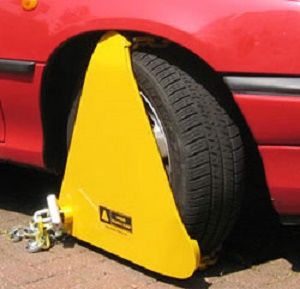CAR IMPOUNDED? This guide outlines the legal steps for reclaiming an impounded vehicle and the DVLA clamp release fees.
There is further guidance on reclaiming your car from the pound. Check how to get your car back after DVLA clamping or vehicle impoundment?
The Driver and Vehicle Licencing Agency rules are clear. They state that every vehicle registered in the UK and in use, must have road tax.
The law applies to all driven vehicles and those kept on a public road. Vehicles kept off-road must either be road taxed or have a car SORN declaration in force.
Note: Failing to meet car road tax regulations could get your car clamped by DVLA instantly or removed.
What is Car Tax Enforcement UK?
Anyone can report an untaxed vehicle – either online or by post. DVLA notice payment system regulates car tax enforcement in the United Kingdom. Vehicles get wheel clamped or towed away if they are not road taxed or do not have a valid Statutory Off Road Notification in force.
In fact, despite 98% of vehicles being taxed correctly, the DVLA clamps or impounds about 10,000 untaxed cars every month.
How to Unclamp Your Vehicle
Untaxed vehicles can get clamped by DVLA or impounded by the authorities. Car clamping rules can also get enforced if an untaxed vehicle is on a public road (even if it has a Statutory Off Road Notification).
Car clamping, or vehicle removal, can also occur if it is off a public road but it does not have a SORN in place.
There will be an information leaflet INF32 left on your clamped vehicle.
You will need to call the number on the back of the INF32 leaflet and pay the fee before they unclamp it.
How to get a clamp off your car? Contact the Car Tax Enforcement UK center for more information on how to get your car unclamped.

Cobalt Notice Payment System
Car Tax Enforcement Contact Number: 0343 224 1999
www.cartaxenforcement.co.uk
DVLA Clamp Release Fee to NSL
The DVLA clamping release fee is £100 if you pay the fine within 24 hours. The cost to de-clamp an untaxed vehicle is less if it’s paid within 24 hours of DVLA car clamping.
Vehicles get impounded after 24 hours if the release fee is not paid. They can destroy it after 7 days of unpaid storage. That is why you should get in touch using the DVLA car pound contact number.
You can pay a ‘surety‘ or deposit if you do not tax the vehicle when you get it released. The surety costs £160 for most cars or motorcycles.
There are variable charges up to £700 for other vehicles. You can lose your surety deposit if you have not taxed the vehicle within 14 days.
Reclaiming an Impounded Vehicle after 24 Hours
If you reclaim your vehicle after 24 hours the DVLA clamp release fee is £200. You still need to get tax and the charge for vehicle storage could be £21 a day. You can pay the clamp release fee online, over the phone, or in person at the DVLA vehicle pound.
Note: UK car tax enforcement can dispose of your vehicle or sell it if you do not pay to get it released.
Reclaiming a Clamped Vehicle
You can find out where your vehicle is by calling the NSL telephone number 03432241999. You can also contact your local police station (call 101). Follow these three steps for reclaiming a clamped vehicle:
- Find out the precise location of your vehicle.
- Pay the DVLA car clamp release fee.
- Provide confirmation or a receipt proving payment for DVLA vehicle road tax.
Other Reasons for Car Clamping Rules
In fact, the powers of bailiffs allow them to use wheel clamps in some circumstances. They can clamp the vehicles of those who have debts with their local council. You could also get car clamped for having an unpaid PCN ‘Penalty Charge Notice‘.
Note: This particular car clamp rule does not apply in Northern Ireland. Contact your local council for more information.
Who is Authorised to Clamp a Vehicle?
There are several authorised bodies who have legal powers to wheel clamp a vehicle in the UK. They include the police, council authorities, and DVLA. The Vehicle and Operator Services Agency (VOSA) also have authorisation for clamping cars.
Other bodies with statutory powers can clamp vehicles at train stations or airports. Some of these choose to contract out their clamping work to private companies.
Note: A landowner cannot legally clamp a vehicle parked on private land in England, Scotland, and Wales.
ALSO IN THIS SECTION
Change Tax Class: Find out the process for making a change of DVLA vehicle tax class.
Road Tax Rules: Changes mean you can now renew car tax online or at the Post Office.
SORN Rules: A guide on how to make a Statutory Off Road Notification for your vehicle.
Importing Vehicles: Information explaining how to import a vehicle into the UK.

